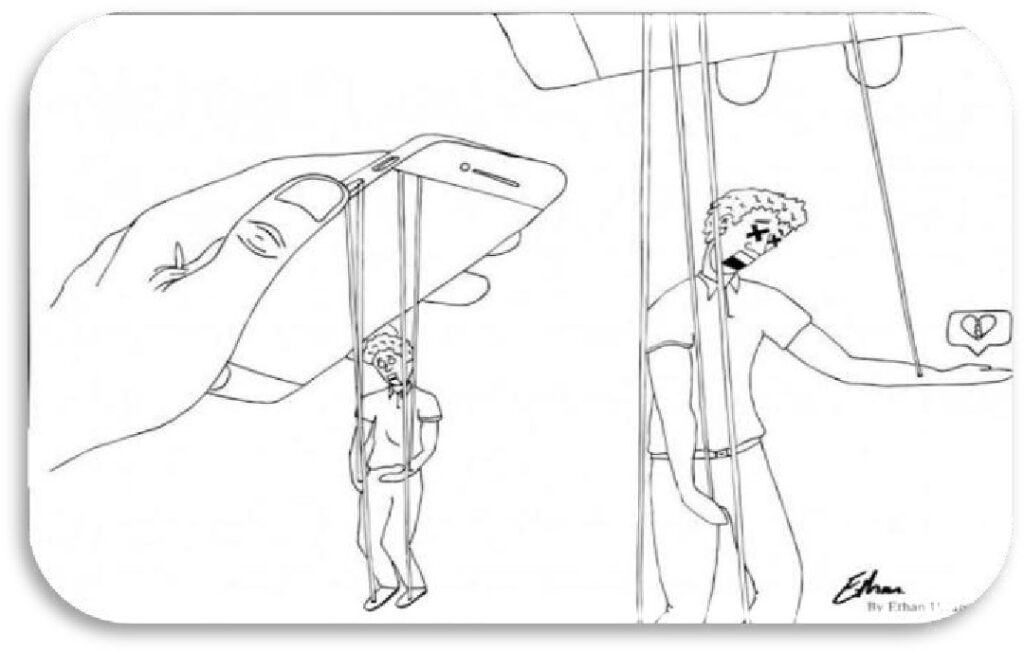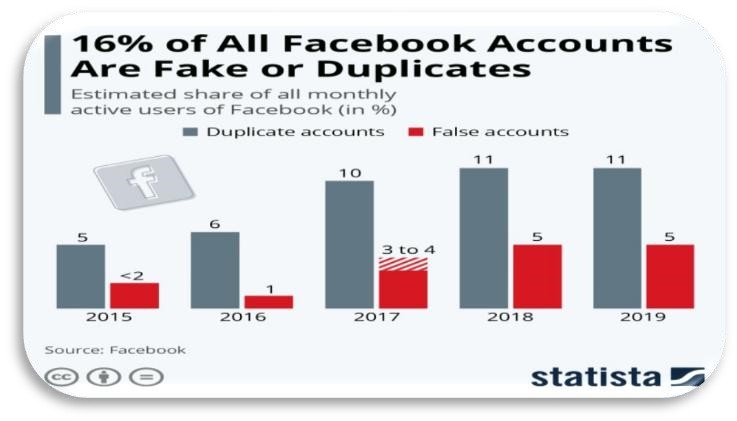Are you really who you say you are?!
Who are you?
Are you this person?!
Lack of personality, deformation of silence, life change, lying, addiction to web sites, theft of character, depression…
In “My So-Called (Instagram) Life,” Clara Dollar writes:
“You’re like a cartoon character,” he said. “Always wearing the same thing every day.”
He meant it as an intimate observation, the kind you can make only after spending a lot of time getting to know each other. You flip your hair to the right. You only eat ice cream out of mugs. You always wear a black leather jacket. I know you.
And he did know me. Rather, he knew the caricature of me that I had created and meticulously cultivated. The me I broadcast to the world on Instagram and Facebook. The witty, creative me, always detached and never cheesy or needy.
That version of me got her start online as my social media persona, but over time (and I suppose for the sake of consistency), she bled off the screen and overtook my real-life personality, too. And once you master what is essentially an onstage performance of yourself, it can be hard to break character.
There was a time when I allowed myself to be more than what could fit onto a 2-by-4-inch screen. When I wasn’t so self-conscious about how I was seen. When I embraced my contradictions and desires with less fear of embarrassment or rejection.”[1]
Introduction
In our society where technology took over our personal lives, It’s really another world behind our phone screens, a perfect world, everything is complete. We see thousands of stories and publications every day and we don’t know who’s real, who’s perfect and who’s just hiding behind his phone screen. Are you really this person or are you just a failure and afraid? Is life so perfect? Where is real life? Is everything a lie and a fake?.
It’s just questions that some ask and others dodge out of fear.
“On the internet nobody knows you’re a dog“
This was an adage and Internet meme about Internet anonymity which began as a caption to a cartoon drawn by Peter Steiner, published by The New Yorker on July 5, 1993.[2] [3]
The words are those of a large dog sitting on a chair at a desk, with his paw on the keyboard of the computer before him, speaking to a smaller dog sitting on the floor beside him.[4] Steiner had earned between $200,000 and $250,000 by 2013 from its reprinting, by which time it had become the cartoon most reproduced from The New Yorker.5

The picture and the saying may have very important messages for people to accept. One of the common mistakes that a person makes is to create a perfect virtual personality and claim it, a perfect life and daily recreational activities, and he traces it until he is convinced that it is his personal identity.
Just last month a 26-year-old Oshkosh man shot and killed his 26-year-old girlfriend and then himself in what police called a murder-suicide.
The victim’s Facebook page shows dozens of happy photos of the two, along with their son who was only nine months old at the time of the murder-suicide.
The page includes a photo of the couple with the caption: “I am so blessed to be able to create a family with this man. You’ve absolutely changed my life and i could not be more grateful for you.”
This is a tragic example of how the lives we portray online may actually be quite different than the lives we actually lead.)[6]

For example, when you say that universities have this amazing life of travel, adventure, partying, love, joy and happiness, this is a false and unhealthy idea that may even be a little unrealistic, this is seen through happy student posts via Facebook and Instagram ,perfect beloved stories and enduring relationships without battles and grief this is a superhuman idea. “Who of us is happy every day” the nature of man is moody plus, there is a prominent class in society. So come on, man, not all of us are posting on his page He is happy and his life is like dreams.
“The more followers they have the better that looks, the more popular you look “
Often we find this saying with celebrities, content makers or anyone with a good percentage of followers. When it comes to judging people based on social media, it appears things aren’t always what they seem.
Here we talk about what we call “rising influencers on the ladder of lies and hypocrisy”. They spread what they want others to see to help them feel better about themselves, making them connected to others.
So do we call this an effect or a hypnosis?
Many social media pioneers are influenced by these people’s lies, and make them feel unsuccessful in front of successful posts and stories that they post across their pages and think most important is the luck that there are no such things in their lives. This may also be seen as a reason to make the person tracking them to lie and spread lies to live a virtual life that makes him feel proud in front of his followers.
“It’s not Me“
Sites seem to cause serious harm to adolescents around the world. Many of them may eerily deny their likeness and prefer either to publish or suppress other characters or to use filters, effects and photoshops that seem to be themselves.
We see that their images are quite contradictory to what they actually are. And standing before the truth has become fabulous for them as a result of their weak personalities and diminishing their social environment.
“Instagram is a social media site known to have a negative impact on the self esteem of its users, especially teenage girls, and the company, owned by FaceBook, has been withholding research proving the harmful effects of its site since 2019.
The Wall Street Journal published an article on September 14th, outlining the statistics known by FaceBook about the toxicity of its social media. The Wall Street Journal article can be found, which claims that a presentation made by Facebook in 2020 included a slide saying “We make body-image issues worse for one in three girls,” as well as having studies showing the link between Instagram and depression and body issues.
Instagram has researched this topic thoroughly with surveys and focus groups, making it impossible for them to deny the damaging side effects of social media. The slideshow stated in no uncertain terms, “Comparisons on Instagram can change how young women view and describe themselves.” This isn’t just a random finding, and FaceBook has been hiding this information for years for their own benefit.
If Facebook and Instagram had this data and didn’t share it, what did they do with it? If they chose to share their research with the public instead, many people would have left the site because they would realize it is bad for them, a prospect that Instagram doesn’t want. So, instead of sharing the truth, they downplayed the negative effects of social media, so people would keep coming back to and using their site.”[7]

Suicide
Social media and suicide is a phenomenon concerning social media’s influence on suicide behavior. Suicide is one of the top leading causes of death worldwide, and as of 2020, the third leading cause of death in those aged 15–24. According to the Center for disease control, suicide accounts for 21.5 percent of deaths, and is the second leading cause of death among adolecents. Globally, suicide accounts for 50 percent of all deaths among men and 71 percent for women. Suicide is a leading cause of death in the United States accounting for 45,979 deaths in 2020.[4] Suicide rates increased by 30 percent from 2000-2018 and declined in 2019 and 2020. Despite suicide prevention programs, therapy, and pharmacological treatments, the suicide rate is constantly growing worldwide. Suicide has been identified not only as an individual phenomenon, but also as being influenced by social and environmental factors. There is growing evidence that online activity have influenced suicide-related behavior. The use of social media throughout the 21st century has grown exponentionaly. There are a variety of sources that are accessible to the public in various forms. Sites include Facebook, Instagram, Twitter, YouTube, Snapchat, TikTok and more. These platforms were intended to allow people to connect in a virtual way, but can lead to cyberbullying, insecurity, emotional distress, and ultimately suicide.[8]
“Don’t hold me responsible, cause that’s not me”:
(Can you really trust anyone?)
Some go so far as to use fake names on social media so they can make nasty posts and comments attacking others anonymously. To avoid liability and punishment
According to Pew Research Center, over 50% of online harassment victims did not know who their attacker was. They hide behind their screens.
This has led to cyberbullying and may make harassment much worse.
Occupy the Internet with inappropriate things, without knowing who they are.
Between revenue and user figures, the latest Facebook quarterly report also contains updated information on the proportion of fake accounts the platform is currently hosting. The social network estimates the proportion of duplicate accounts at eleven percent of monthly active users – that would be around 275 million user profiles. The proportion of ‘false’ – misclassified and ‘undesirable’ – accounts is said to be five percent (about 137 million user profiles). However, it is difficult to judge any developments in this area on the basis of the data. This is due to the fact that a comparison with previous years is only possible to a limited extent due to continuously evolving detection methods.[9]

Conclusion: “Be you”
Social media has become increasingly popular because it allows users to connect and share with others. Aside from its entertainment value, it also allows people to network and meet others with shared interests. And it certainly isn’t going anywhere.
At the end of the word, you can be you. If you go back a step and think, everyone’s going through everyday things like you. And the things people post tend to be fun things.
Instead of spending your time taking photos, spend your time enjoying experiences and sharing on social media, with your friends in the real world.
Always remember :
Nobody cares about your fake life in social media.
[1] https://www.nytimes.com/2017/05/05/style/modern-lovemy-so-called-instagram-life.html
[2] Fleishman, Glenn (December 14, 2000). “Cartoon Captures Spirit of the Internet”. The New York Times. Archived from the original on December 29, 2017. Retrieved October 1, 2007.
[3] Aikat, Debashis “Deb” (1993). “On the Internet, nobody knows you’re a dog”. University of North Carolina at Chapel Hill. Archived from the original on October 29, 2005.
Retrieved February 8, 2019.
[4] EURSOC Two (2007). “New Privacy Concerns”. EURSOC.
Archived from the original on January 26, 2009.
Retrieved January 26, 2009
[5] https://en.wikipedia.org/wiki/On_the_Internet,_nobody_kn ows_you%27re_a_dog
[6] https://advancetitan.com/opinion/staffeditorial/2019/04/11
[7] CLARA DEL VECCHIO, News editor https://thegillnetter.com/11487/opinion/youre-not-theproblem-its-social-media
[8] https://en.wikipedia.org/wiki/Social_media_and_suicide
[9] https://www.statista.com/chart/20685/duplicate-and-falsefacebook-accounts/